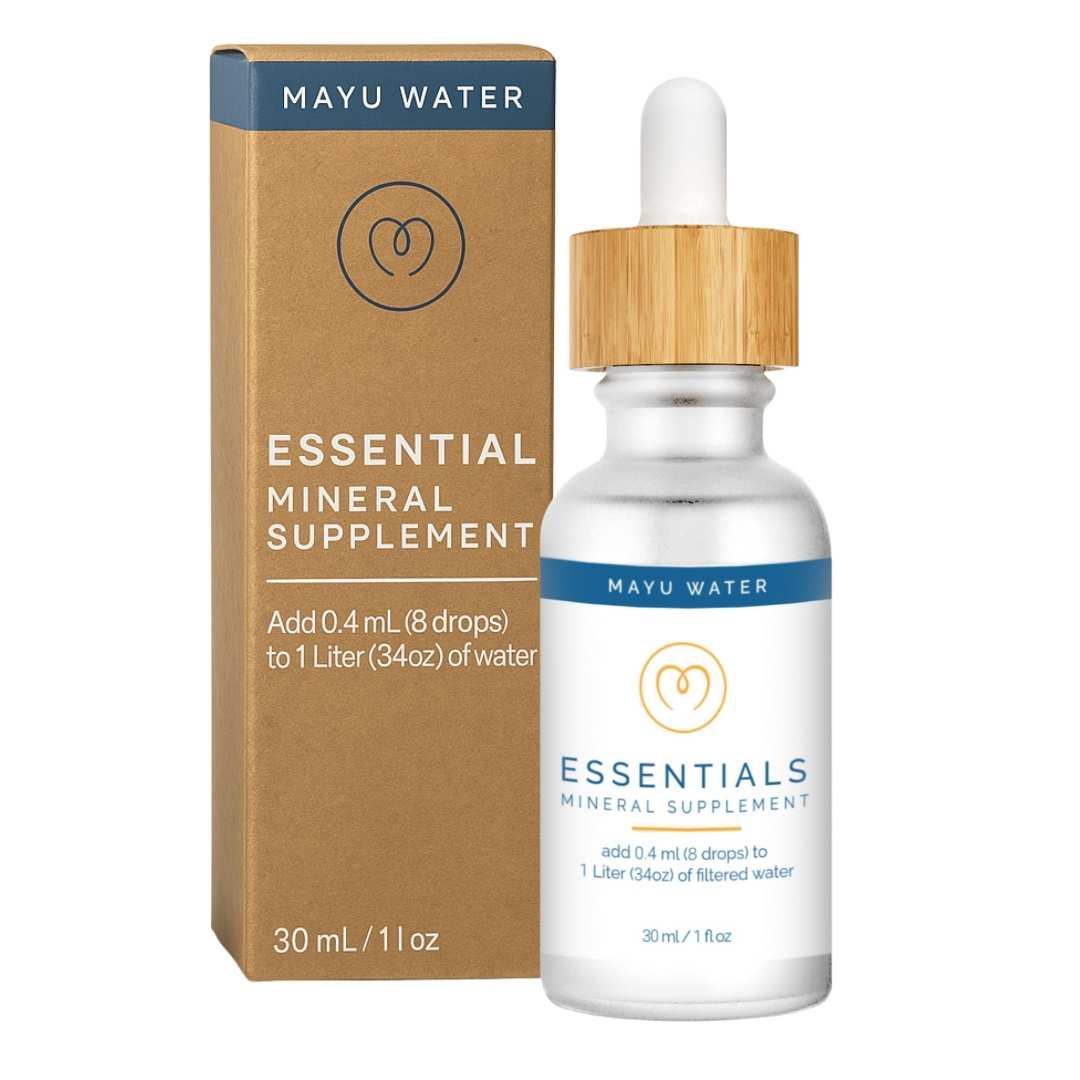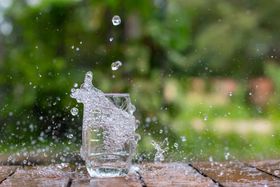Is Milk Really More Hydrating Than Water? Expert Fact-Checks
Is your go-to hydration choice all it's cracked up to be? We fact-check the surprising claims about milk's hydrating power.
Published April 5, 2025.

We're told water is the gold standard for hydration. But could milk be better? Some studies, like a 2016 AJCN trial, suggest milk hydrates longer by reducing urine output due to its electrolytes and macronutrients—even rivaling oral rehydration solutions [1].
Critics point to small, short-term, dairy-funded studies. Relying on milk for hydration could also mean high-calorie intake, hindering weight goals, not to mention lactose intolerance and its lack of refreshment on hot days.
Below, we'll explore if milk really is more hydrating than water.
» Hydrate yourself with the MAYU Full Cycle System
Key Body Processes for Hydration
A drink's hydration power depends on its electrolytes, solutes, and how quickly it leaves your stomach:
- Solute concentration drives osmosis, the movement of water from less concentrated to more concentrated areas of your body. Drinking a highly salty solution pulls water out of your cells (dehydration), while a drink with more water and fewer solutes helps hydrate you [2].
- Electrolytes affect hydration, as our body maintains tight control over their level. For instance, a very salty drink pulls water from the body cells, leading to dehydration. Potassium has the opposite effect [3].
- The composition of the beverage influences the rate at which the stomach discharges it into the small intestine ( gastric emptying rate) [4]. High-energy drinks, for example, are slowly absorbed and delay urinary excretion to improve hydration.
» Find out how electrolytes fight fatigue and boost your energy
BHI: How It's Calculated and Milk/Water Ranking
The Beverage Hydration Index (BHI) measures how well a drink keeps you hydrated compared to plain water [5].
Scientists do this by having people drink 1 liter of a beverage and then measuring how much urine they produce in the next 4 hours. They compare this urine output to the urine output after drinking the same amount of plain water to determine the BHI.
Think of it like this:
- Water has a BHI of 1.0. This is the baseline.
- A BHI higher than 1.0 means you retain more fluid and urinate less than when you drink water, suggesting better hydration.
- A BHI lower than 1.0 means you urinate more, indicating the beverage isn't as hydrating as water.
As the image below shows, two hours after consumption, still water has a BHI score of 1.0, and full-fat and skimmed milk have scores between 1.3 and 1.5.
» Check out the best refreshing drinks to make at home
How Milk's Ingredients Affect Hydration
- Milk is naturally hydrating because it's mostly water (88.1%) [6]. Its solute concentration is also very similar to that of our body fluids (almost isotonic), which helps our bodies absorb and retain it better than plain water.
- Milk contains about 3.2 grams of protein per 100 ml. Research shows that milk is a highly hydrating drink, regardless of the specific types of protein (casein and whey) it contains [7].
- Full-fat milk contains natural sugars and fat, making it a relatively energy-rich drink (640 calories per liter). Research shows that drinks with more energy tend to hydrate you better than plain water, contributing to milk's high Beverage Hydration Index (BHI) [8].
- Milk is a good source of important electrolytes like calcium, phosphorus, sodium, and especially potassium. A study showed that milk, which helps the body retain potassium, has a very high BHI, meaning it's excellent for hydration.
» Discover the best times to drink water for optimal hydration
Hydration Differences in Milk Types
Skim and Full-Fat Milk
Studies show that both skim milk (very low fat) and full-fat milk are highly hydrating, even though they have different amounts of fat [8].
While some research suggests that higher-fat milk might be slightly better for hydration, other studies have found that skim milk is just as effective as commercial sports drinks for rehydrating after exercise [9].
Whole Milk
Whole milk is a good hydrating drink with a high BHI. But, it has a similar amount of protein to skim and low-fat milk, and more protein doesn't seem to make milk even more hydrating.
Also, the higher fat content in whole milk doesn't appear to offer any extra hydration benefits compared to lower-fat options [10].
Chocolate Milk
Chocolate milk is nutritionally similar to regular milk, except it has more sugar. It's good for recovering after exercise, but don't expect it to be more hydrating than regular milk [11].
» Check out the best water types to drink for dehydration
Milk vs. Water: Hydration for Different Situations
1. Exercise
An animal study indicated that a milk protein drink alone, without electrolytes, helped maintain hydration after exercise [12].
Additionally, researchers conducted a study to determine if chocolate milk was more effective than carbohydrate-based or general fluid replacement drinks in aiding recovery for endurance cyclists after strenuous exercise [13].
Milk isn't suitable for people with milk protein allergies or lactose intolerance. A study found that even individuals without known lactose issues can experience digestive problems and difficulty absorbing nutrients after drinking milk-based beverages [14].
2. Daily Hydration
Milk is an easy-to-get drink for everyday hydration. Research shows that both full-fat and skim milk hydrate better than plain water in the two hours after you drink them.
Another study found that people who drank milk after exercise were still well-hydrated an hour later, while those who drank other things were not [15].
Vegans can't use dairy-like milk for hydration. Many people simply don't like the taste or smell of milk, even if they can digest it fine.
3. Illness
For vegetarians recovering from surgery, milk is a simple way to get essential high-quality proteins. Its low carbohydrate content also makes milk a good drink option for people with diabetes.
Because milk is high in electrolytes, it's generally not recommended for people with kidney, liver, or certain heart problems. It can also interfere with the way some medications, such as antibiotics, NSAIDs, and antacids, work [16].
Why Water Remains the Hydration Gold Standard Despite Milk's BHI
Safety and easy access remain the top reasons why water is still the gold standard for hydration in clinical and sports medicine contexts.
It's also quickly absorbed and does not require digestive enzymes or excess energy, which are important considerations in clinical settings where chronic illnesses compromise the digestion process.
Milk vs. Water for Hydration Across Age Groups
Children
For babies under a year old, milk is not recommended. However, for older kids, after hard exercise in the heat, some studies suggest milk might hydrate better than water [17].
But, many children are allergic to milk, which can cause issues like hives or breathing problems. For kids with allergies, asthma, or lactose intolerance, plain water is the best way to stay hydrated.
Adults
Milk is good for rehydrating active adults and athletes after exercise. But, for everyday hydration, adults might need to drink a lot of milk (five to six glasses, especially in hot weather), which could increase their fat and calorie intake.
Adults with digestion problems, certain liver issues, or milk allergies should stick to water for their daily hydration needs .
Seniors
Many older people can drink milk, but as we age, it becomes harder to digest lactose (the sugar in milk). One study found that half of older adults have trouble with lactose, making milk a poor choice for hydration [18,19].
Water is still the best way for them to stay hydrated, and they can get their nutrients from eating a variety of foods. Also, older adults can sometimes have more trouble balancing fluids and electrolytes.
A study showed they stayed hydrated after drinking water and juice but not as well after drinking milk [20].
» Check out the best mineral drops to boost your hydration
Rehydrating With Milk: Is It a Good Idea?
When someone is really dehydrated or has heatstroke, milk might not be the best way to rehydrate. First, they might not be able to drink enough milk to get properly hydrated.
For example, heatstroke can cause confusion or even seizures. Second, when someone is very sick, their body might have trouble digesting and absorbing milk [21]. Third, plain water is the easiest and fastest way to get fluids back into the body in these serious situations.
» Learn to check for dehydration at home
Downsides of Using Milk Instead of Water for Hydration
Can Worsen Condition Symptoms
Milk can worsen the symptoms of conditions like irritable bowel syndrome or Crohn's disease [22].
People who are lactose intolerant will likely experience problems like diarrhea, cramps, feeling sick, and bloating very quickly after drinking milk. Also, individuals allergic to milk proteins will find their allergy symptoms flare up if they consume milk.
Can Be Fatal
Milk is often not recommended for many health problems that require very specific diets. For example, people with kidney failure and certain heart conditions should avoid milk. Its high potassium can cause dangerous heart rhythm and fluid balance problems if not treated quickly.
Can Lead to Weight Gain
With full-fat milk being rich in fat and calories, using it instead of water can lead to weight gain. For example, one liter of full-fat milk has 640 calories. As 3000 calories are required to put on 1 kilogram of body weight, you can gain a kilogram in just 6 days.
» Find out if drinking water supports effective weight loss
Milk vs. Water Hydration Claims: Science vs. Misconceptions
One of the main studies that suggests milk is better at hydrating than water is by Maughan and colleagues [8]. While this study is based on science, even the researchers themselves point out that the people they tested weren't dehydrated to begin with.
So, we don't know if milk would still be better than water for people who are actually dehydrated.
We know milk is more hydrating than water, likely because it's mostly water and contains electrolytes. But scientists aren't completely sure exactly why milk is better at hydration.
Some studies that say milk hydrates better were done with people doing very hard exercise in hot weather. These results might not be the same for those who are only moderately active or who live in colder climates.
» Check out the best lemon water alternatives for a morning pick-me-up
Overall Verdict: Milk vs. Water for Hydration
The evidence isn't strong enough to definitively say milk hydrates better than water. One key study only found a small difference in urine output between people who drank water and those who drank milk, which might not be a significant difference.
Also, many studies suggesting milk is better have been done with only a small number of people. We need larger studies to be sure of these results.
» Make sure you're primed with hydration with the Full Cycle System
References:
- R. J. Maughan et al., “A randomized trial to assess the potential of different beverages to affect hydration status: development of a beverage hydration index,” American Journal of Clinical Nutrition, vol. 103, no. 3, pp. 717–723, Dec. 2015, doi: 10.3945/ajcn.115.114769. Available: https://pubmed.ncbi.nlm.nih.gov/26702122/
- National Academies Press (US), “Water and electrolytes,” Recommended Dietary Allowances - NCBI Bookshelf, 1989. Available: https://www.ncbi.nlm.nih.gov/books/NBK234935/
- A. S. Terker et al., “Potassium Modulates Electrolyte Balance and Blood Pressure through Effects on Distal Cell Voltage and Chloride,” Cell Metabolism, vol. 21, no. 1, pp. 39–50, Jan. 2015, doi: 10.1016/j.cmet.2014.12.006. Available: https://pmc.ncbi.nlm.nih.gov/articles/PMC4332769/
- J. B. Leiper, “Fate of ingested fluids: factors affecting gastric emptying and intestinal absorption of beverages in humans,” Nutrition Reviews, vol. 73, no. suppl 2, pp. 57–72, Aug. 2015, doi: 10.1093/nutrit/nuv032. Available: https://pubmed.ncbi.nlm.nih.gov/26290292/
- R. J. Maughan et al., “A randomized trial to assess the potential of different beverages to affect hydration status: development of a beverage hydration index,” American Journal of Clinical Nutrition, vol. 103, no. 3, pp. 717–723, Dec. 2015, doi: 10.3945/ajcn.115.114769. Available: https://pubmed.ncbi.nlm.nih.gov/26702122/
- “Milk, whole, 3.25% milkfat, with added vitamin D.” Available: https://fdc.nal.usda.gov/food-details/746782/nutrients
- M. Millard-Stafford, T. K. Snow, M. L. Jones, and H. Suh, “The beverage hydration index: influence of electrolytes, carbohydrate and protein,” Nutrients, vol. 13, no. 9, p. 2933, Aug. 2021, doi: 10.3390/nu13092933. Available: https://www.mdpi.com/2072-6643/13/9/2933
- R. J. Maughan et al., “A randomized trial to assess the potential of different beverages to affect hydration status: development of a beverage hydration index,” American Journal of Clinical Nutrition, vol. 103, no. 3, pp. 717–723, Dec. 2015, doi: 10.3945/ajcn.115.114769. Available: https://pubmed.ncbi.nlm.nih.gov/26702122/
- P. Watson, T. D. Love, R. J. Maughan, and S. M. Shirreffs, “A comparison of the effects of milk and a carbohydrate-electrolyte drink on the restoration of fluid balance and exercise capacity in a hot, humid environment,” European Journal of Applied Physiology, vol. 104, no. 4, pp. 633–642, Jul. 2008, doi: 10.1007/s00421-008-0809-4. Available: https://pubmed.ncbi.nlm.nih.gov/18618137/
- L. J. James et al., “Effect of varying the concentrations of carbohydrate and milk protein in rehydration solutions ingested after exercise in the heat,” British Journal of Nutrition, vol. 110, no. 7, pp. 1285–1291, May 2013, doi: 10.1017/s0007114513000536. Available: https://pubmed.ncbi.nlm.nih.gov/23721750/
- J. R. Karp, J. D. Johnston, S. Tecklenburg, T. D. Mickleborough, A. D. Fly, and J. M. Stager, “Chocolate milk as a Post-Exercise recovery aid,” International Journal of Sport Nutrition and Exercise Metabolism, vol. 16, no. 1, pp. 78–91, Feb. 2006, doi: 10.1123/ijsnem.16.1.78. Available: https://pubmed.ncbi.nlm.nih.gov/16676705/
- K. Ishihara et al., “Electrolyte-free milk protein solution influences sodium and fluid retention in rats,” Journal of Nutritional Science, vol. 2, Jan. 2013, doi: 10.1017/jns.2012.24. Available: https://pmc.ncbi.nlm.nih.gov/articles/PMC4153017/
- J. R. Karp, J. D. Johnston, S. Tecklenburg, T. D. Mickleborough, A. D. Fly, and J. M. Stager, “Chocolate milk as a Post-Exercise recovery aid,” International Journal of Sport Nutrition and Exercise Metabolism, vol. 16, no. 1, pp. 78–91, Feb. 2006, doi: 10.1123/ijsnem.16.1.78. Available: https://pubmed.ncbi.nlm.nih.gov/16676705/
- I. Russo, P. A. Della Gatta, A. Garnham, J. Porter, L. M. Burke, and R. J. S. Costa, “Does the nutritional composition of dairy milk based recovery beverages influence post-exercise gastrointestinal and immune status, and subsequent markers of recovery optimisation in response to high intensity interval exercise?,” Frontiers in Nutrition, vol. 7, Jan. 2021, doi: 10.3389/fnut.2020.622270. Available: https://pmc.ncbi.nlm.nih.gov/articles/PMC7840831/
- S. M. Shirreffs, P. Watson, and R. J. Maughan, “Milk as an effective post-exercise rehydration drink,” British Journal of Nutrition, vol. 98, no. 1, pp. 173–180, Apr. 2007, doi: 10.1017/s0007114507695543. Available: https://www.cambridge.org/core/journals/british-journal-of-nutrition/article/milk-as-an-effective-postexercise-rehydration-drink/B358D6BE20736AF3DA0373D63E72CC65
- “Drug Interaction With Milk and The Relevance of Acidifying/Alkalizing Nature of Food,” Clinical Therapeutics, Available: https://www.clinicaltherapeutics.com/article/S0149-2918(15)00509-3/fulltext
- K. A. Volterman, J. Obeid, B. Wilk, and B. W. Timmons, “Effect of milk consumption on rehydration in youth following exercise in the heat,” Applied Physiology Nutrition and Metabolism, vol. 39, no. 11, pp. 1257–1264, Jul. 2014, doi: 10.1139/apnm-2014-0047. Available: https://pubmed.ncbi.nlm.nih.gov/25171815/
- S. Darougar, M. Mansouri, S. Hassani, M. R. Sohrabi, and P. Hashemitari, “The effect of a cow’s milk-free diet on asthma control in children: a quasi-experimental study,” Feb. 15, 2021. Available: https://pmc.ncbi.nlm.nih.gov/articles/PMC8012302/
- J. A. Almeida, R. Kim, A. Stoita, C. J. McIver, J. Kurtovic, and S. M. Riordan, “Lactose malabsorption in the elderly: Role of small intestinal bacterial overgrowth,” Scandinavian Journal of Gastroenterology, vol. 43, no. 2, pp. 146–154, Jan. 2008, doi: 10.1080/00365520701676617. Available: https://pubmed.ncbi.nlm.nih.gov/18224561/
- N. Rodriguez-Sanchez and S. D. R. Galloway, “A randomised trial to assess fluid and electrolyte balance responses following ingestion of different beverages in young and older men,” European Journal of Applied Physiology, vol. 123, no. 10, pp. 2331–2340, Jun. 2023, doi: 10.1007/s00421-023-05241-0. Available: https://pmc.ncbi.nlm.nih.gov/articles/PMC10492686/
- “Is it heat exhaustion or heat stroke? Here are the symptoms to watch for.” Available: https://health.ucdavis.edu/blog/cultivating-health/is-it-heat-exhaustion-or-heat-stroke-here-are-the-symptoms-to-watch-for/2024/07
- R. Kempinski, D. Arabasz, and K. Neubauer, “Effects of Milk and Dairy on the Risk and Course of Inflammatory Bowel Disease versus Patients’ Dietary Beliefs and Practices: A Systematic Review,” Nutrients, vol. 16, no. 15, p. 2555, Aug. 2024, doi: 10.3390/nu16152555. Available: https://pmc.ncbi.nlm.nih.gov/articles/PMC11313810/
Disclaimer: The information published by Mayu Water is not a substitute for the expert knowledge, advice, and recommendations of trained professionals. We strongly recommend consulting with industry experts and primary or scientific sources before making any health, research-related, or other important decisions.

















































